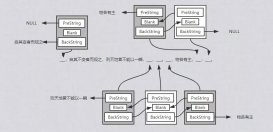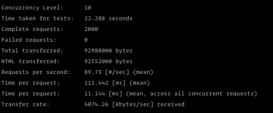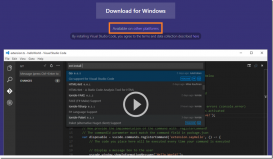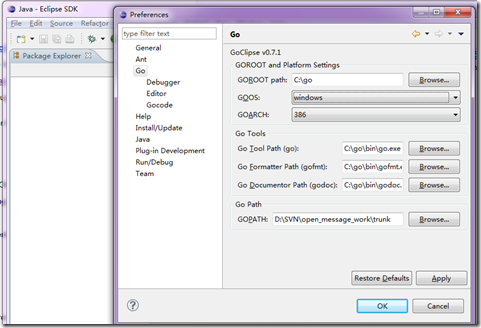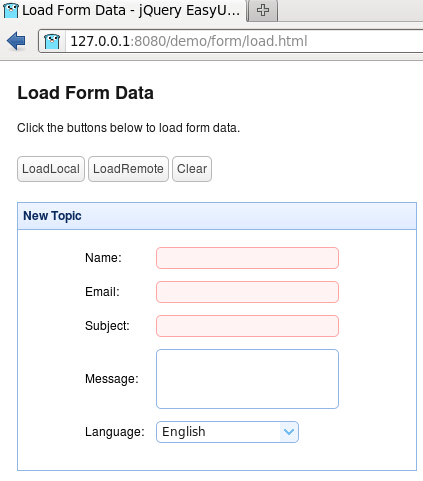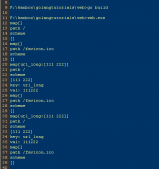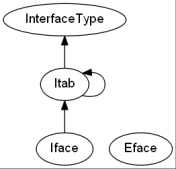前言
select作为Go chan通信的重要监听工具,有着很广泛的使用场景。select的使用主要是搭配通信case使用,表面上看,只是简单的select及case搭配,实际上根据case的数量及类型,在编译时select会进行优化处理,根据不同的情况调用不同的底层逻辑。
select的编译处理
select编译时的核心处理逻辑如下:
|
1
2
3
4
5
6
7
8
9
10
11
12
13
14
15
16
17
18
19
20
21
22
23
24
25
26
27
28
29
30
31
32
33
34
35
36
37
38
39
40
41
42
43
44
45
46
47
48
49
50
51
52
53
54
55
56
57
58
59
60
61
62
63
64
65
66
67
68
69
70
71
72
73
74
75
76
77
78
79
80
81
82
83
84
85
86
87
88
89
90
91
92
93
94
95
96
97
98
99
100
101
102
103
104
105
106
107
108
109
110
111
112
113
114
115
116
117
118
119
120
121
122
123
124
125
126
127
128
129
130
131
132
133
134
135
136
137
138
139
140
141
142
143
144
145
146
147
148
149
150
151
152
153
154
155
156
157
158
159
160
161
162
163
164
165
166
167
168
169
170
171
172
173
174
175
176
177
178
179
180
181
182
183
184
185
186
187
188
189
190
191
192
193
194
195
196
197
198
199
200
201
202
203
204
205
206
207
208
209
210
211
212
213
214
215
216
217
218
219
220
221
222
223
224
225
226
227
228
229
230
231
232
233
234
235
236
237
238
239
240
241
242
243
244
245
246
247
248
249
250
251
252
253
254
255
256
257
258
259
260
261
262
|
func walkselectcases(cases *Nodes) []*Node { ncas := cases.Len() sellineno := lineno // optimization: zero-case select // 针对没有case的select优化 if ncas == 0 { return []*Node{mkcall("block", nil, nil)} } // optimization: one-case select: single op. // 针对1个case(单个操作)select的优化 if ncas == 1 { cas := cases.First() setlineno(cas) l := cas.Ninit.Slice() if cas.Left != nil { // not default: 非default case n := cas.Left // 获取case表达式 l = append(l, n.Ninit.Slice()...) n.Ninit.Set(nil) switch n.Op { default: Fatalf("select %v", n.Op) case OSEND: // Left <- Right // already ok // n中已包含left/right case OSELRECV, OSELRECV2: // OSELRECV(Left = <-Right.Left) OSELRECV2(List = <-Right.Left) if n.Op == OSELRECV || n.List.Len() == 0 { // 左侧有0或1个接收者 if n.Left == nil { // 没有接收者 n = n.Right // 只需保留右侧 } else { // n.Op = OAS // 只有一个接收者,更新Op为OAS } break } if n.Left == nil { // 检查是否表达式或赋值 nblank = typecheck(nblank, ctxExpr|ctxAssign) n.Left = nblank } n.Op = OAS2 // OSELRECV2多个接收者 n.List.Prepend(n.Left) // 将left放在前面 n.Rlist.Set1(n.Right) n.Right = nil n.Left = nil n.SetTypecheck(0) n = typecheck(n, ctxStmt) } l = append(l, n) } l = append(l, cas.Nbody.Slice()...) // case内的处理 l = append(l, nod(OBREAK, nil, nil)) // 添加break return l } // convert case value arguments to addresses. // this rewrite is used by both the general code and the next optimization. var dflt *Node for _, cas := range cases.Slice() { setlineno(cas) n := cas.Left if n == nil { dflt = cas continue } switch n.Op { case OSEND: n.Right = nod(OADDR, n.Right, nil) n.Right = typecheck(n.Right, ctxExpr) case OSELRECV, OSELRECV2: if n.Op == OSELRECV2 && n.List.Len() == 0 { n.Op = OSELRECV } if n.Left != nil { n.Left = nod(OADDR, n.Left, nil) n.Left = typecheck(n.Left, ctxExpr) } } } // optimization: two-case select but one is default: single non-blocking op. if ncas == 2 && dflt != nil { cas := cases.First() if cas == dflt { cas = cases.Second() } n := cas.Left setlineno(n) r := nod(OIF, nil, nil) r.Ninit.Set(cas.Ninit.Slice()) switch n.Op { default: Fatalf("select %v", n.Op) case OSEND: // if selectnbsend(c, v) { body } else { default body } ch := n.Left r.Left = mkcall1(chanfn("selectnbsend", 2, ch.Type), types.Types[TBOOL], &r.Ninit, ch, n.Right) case OSELRECV: // if selectnbrecv(&v, c) { body } else { default body } ch := n.Right.Left elem := n.Left if elem == nil { elem = nodnil() } r.Left = mkcall1(chanfn("selectnbrecv", 2, ch.Type), types.Types[TBOOL], &r.Ninit, elem, ch) case OSELRECV2: // if selectnbrecv2(&v, &received, c) { body } else { default body } ch := n.Right.Left elem := n.Left if elem == nil { elem = nodnil() } receivedp := nod(OADDR, n.List.First(), nil) receivedp = typecheck(receivedp, ctxExpr) r.Left = mkcall1(chanfn("selectnbrecv2", 2, ch.Type), types.Types[TBOOL], &r.Ninit, elem, receivedp, ch) } r.Left = typecheck(r.Left, ctxExpr) r.Nbody.Set(cas.Nbody.Slice()) r.Rlist.Set(append(dflt.Ninit.Slice(), dflt.Nbody.Slice()...)) return []*Node{r, nod(OBREAK, nil, nil)} } if dflt != nil { ncas-- } casorder := make([]*Node, ncas) nsends, nrecvs := 0, 0 var init []*Node // generate sel-struct lineno = sellineno selv := temp(types.NewArray(scasetype(), int64(ncas))) r := nod(OAS, selv, nil) r = typecheck(r, ctxStmt) init = append(init, r) // No initialization for order; runtime.selectgo is responsible for that. order := temp(types.NewArray(types.Types[TUINT16], 2*int64(ncas))) var pc0, pcs *Node if flag_race { pcs = temp(types.NewArray(types.Types[TUINTPTR], int64(ncas))) pc0 = typecheck(nod(OADDR, nod(OINDEX, pcs, nodintconst(0)), nil), ctxExpr) } else { pc0 = nodnil() } // register cases for _, cas := range cases.Slice() { setlineno(cas) init = append(init, cas.Ninit.Slice()...) cas.Ninit.Set(nil) n := cas.Left if n == nil { // default: continue } var i int var c, elem *Node switch n.Op { default: Fatalf("select %v", n.Op) case OSEND: i = nsends nsends++ c = n.Left elem = n.Right case OSELRECV, OSELRECV2: nrecvs++ i = ncas - nrecvs c = n.Right.Left elem = n.Left } casorder[i] = cas setField := func(f string, val *Node) { r := nod(OAS, nodSym(ODOT, nod(OINDEX, selv, nodintconst(int64(i))), lookup(f)), val) r = typecheck(r, ctxStmt) init = append(init, r) } c = convnop(c, types.Types[TUNSAFEPTR]) setField("c", c) if elem != nil { elem = convnop(elem, types.Types[TUNSAFEPTR]) setField("elem", elem) } // TODO(mdempsky): There should be a cleaner way to // handle this. if flag_race { r = mkcall("selectsetpc", nil, nil, nod(OADDR, nod(OINDEX, pcs, nodintconst(int64(i))), nil)) init = append(init, r) } } if nsends+nrecvs != ncas { Fatalf("walkselectcases: miscount: %v + %v != %v", nsends, nrecvs, ncas) } // run the select lineno = sellineno chosen := temp(types.Types[TINT]) recvOK := temp(types.Types[TBOOL]) r = nod(OAS2, nil, nil) r.List.Set2(chosen, recvOK) fn := syslook("selectgo") r.Rlist.Set1(mkcall1(fn, fn.Type.Results(), nil, bytePtrToIndex(selv, 0), bytePtrToIndex(order, 0), pc0, nodintconst(int64(nsends)), nodintconst(int64(nrecvs)), nodbool(dflt == nil))) r = typecheck(r, ctxStmt) init = append(init, r) // selv and order are no longer alive after selectgo. init = append(init, nod(OVARKILL, selv, nil)) init = append(init, nod(OVARKILL, order, nil)) if flag_race { init = append(init, nod(OVARKILL, pcs, nil)) } // dispatch cases dispatch := func(cond, cas *Node) { cond = typecheck(cond, ctxExpr) cond = defaultlit(cond, nil) r := nod(OIF, cond, nil) if n := cas.Left; n != nil && n.Op == OSELRECV2 { x := nod(OAS, n.List.First(), recvOK) x = typecheck(x, ctxStmt) r.Nbody.Append(x) } r.Nbody.AppendNodes(&cas.Nbody) r.Nbody.Append(nod(OBREAK, nil, nil)) init = append(init, r) } if dflt != nil { setlineno(dflt) dispatch(nod(OLT, chosen, nodintconst(0)), dflt) } for i, cas := range casorder { setlineno(cas) dispatch(nod(OEQ, chosen, nodintconst(int64(i))), cas) } return init} |
select编译时会根据case的数量进行优化:
1.没有case
直接调用block
2.1个case
(1)default case,直接执行body
(2) send/recv case (block为true),按照单独执行的结果确认,可能会发生block
(3) send调用对应的chansend1
(4) recv调用对应的chanrecv1/chanrecv2
3.2个case且包含一个default case
(1) send/recv case (block为false),按照单独执行的结果确认case是否ok,!ok则执行default case,不会发生block
(2) send调用对应的selectnbsend
(3) recv调用对应的selectnbrecv/selectnbrecv2
4.一般的case
selectgo
总结
最后,以一张图进行简单总结。
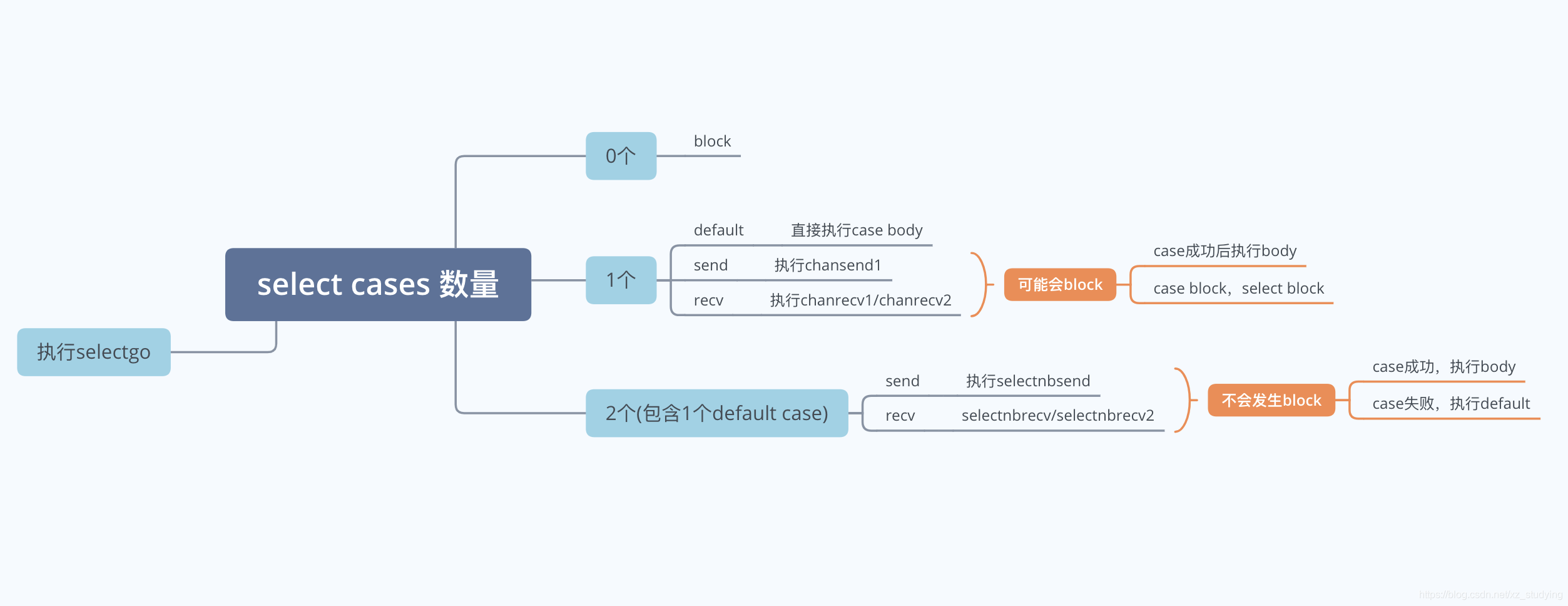
以上就是go select编译期的优化处理逻辑使用场景分析的详细内容,更多关于go select编译的资料请关注服务器之家其它相关文章!
原文链接:https://blog.csdn.net/xz_studying/article/details/118280886


